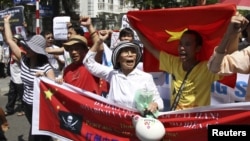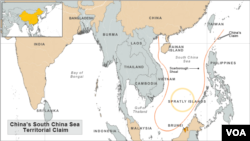JAKARTA — The secretary-general of the Association of Southeast Asian Nations (ASEAN) says the group needs more cohesion, but will not be held hostage to outside pressure or internal disagreements over the disputed South China Sea. ASEAN is struggling to dispel concerns about divisions among member states, after a chaotic annual gathering in Cambodia failed to produce an agreement governing actions in the South China Sea.
Four the of 10 ASEAN members - Vietnam, the Philippines, Malaysia and Brunei - claim parts of those waters, which hold vast fisheries, provide vital shipping lanes for trade and are said to be rich in oil. But China also says it has sovereignty over nearly the entire area.
The summit earlier this month was expected to help ASEAN achieve a higher profile and cement confidence, but it revealed ongoing disunity among a bloc whose relevance has been questioned by many foreign-affairs observers.
Wednesday, ASEAN Secretary-General Surin Pitsuwan acknowledged the group's shortcomings and said it needs to be more agile and effective when dealing with outside powers. "Our member states will have to survey the landscape and the terrain and the waters very carefully, what could be an issue of controversy, so that we will be able to either avoid them or minimize the impact," said Pitsuwan.
A report released Tuesday by the International Crisis Group says ASEAN's ineffectiveness in resolving the dispute and more aggressive actions by countries claiming sovereignty over parts of the sea raised concerns the region's biggest potential military flashpoint could escalate into armed conflict.
"You have got levels of trust diminishing, but then possible diplomatic options for trying to lessen those tensions are not working very well right now," said analyst Bryony Lau of the Crisis Group in Jakarta.
The Crisis Group report says China is working to exploit divisions among ASEAN members by offering preferential treatment to those that do not side with its rival claimants.
Vietnam raised the issue of the South China Sea in ASEAN's 2010 regional forum. In 2011 the Philippines took it up with even more fervor. Lau says that created internal tensions that played on already existent divisions.
"The fact that there are states within ASEAN that have very different interests, have very different priorities, have different relationships with the United States and China, all of those are elements [that] come into play when it comes to ASEAN's capacity to deal with the South China Sea," added Lau.
A six-point declaration drafted by Indonesia on how ASEAN would move forward on the code of conduct on the South China Sea has provided some reassurance, but continued provocations from China have done little to downplay tensions.
China said Sunday it had established a new municipality on a sparsely populated islet it calls Sansha and would deploy a garrison of soldiers to guard the islands it claims. Vietnam, which says the islet is part of its territory, called the move a "serious violation" of its sovereignty. The Philippines has also responded to recent aggressions by calling for strong resolve against Chinese rhetoric.
There are fears ASEAN could be in danger of cracking under China's growing influence in the region. Some also worry that its role in the region poses direct challenges to the United States, which has close relations with some ASEAN members, including the Philippines.
ASEAN has grown in size and economic importance in recent years and is on its way to creating an ASEAN economic community by 2015. But Secretary-General Pitsuwan said the impasse over the South China Sea would not have a material impact on economic integration.
"We are going full steam toward our economic activities, our economic integration," Pitsuwan noted. "It will have some psychological impact on the external partners, but as far as ASEAN is concerned, I think our vibrant economy, it is not going to be held hostage to the issue of the disagreement or the controversy of the South China Sea."
Despite the reassurance, analysts say ASEAN needs to make progress on the code of conduct to ensure that the South China Sea does not stoke further divisions and to prevent the dispute from becoming a U.S.-China issue.
Four the of 10 ASEAN members - Vietnam, the Philippines, Malaysia and Brunei - claim parts of those waters, which hold vast fisheries, provide vital shipping lanes for trade and are said to be rich in oil. But China also says it has sovereignty over nearly the entire area.
The summit earlier this month was expected to help ASEAN achieve a higher profile and cement confidence, but it revealed ongoing disunity among a bloc whose relevance has been questioned by many foreign-affairs observers.
Wednesday, ASEAN Secretary-General Surin Pitsuwan acknowledged the group's shortcomings and said it needs to be more agile and effective when dealing with outside powers. "Our member states will have to survey the landscape and the terrain and the waters very carefully, what could be an issue of controversy, so that we will be able to either avoid them or minimize the impact," said Pitsuwan.
A report released Tuesday by the International Crisis Group says ASEAN's ineffectiveness in resolving the dispute and more aggressive actions by countries claiming sovereignty over parts of the sea raised concerns the region's biggest potential military flashpoint could escalate into armed conflict.
"You have got levels of trust diminishing, but then possible diplomatic options for trying to lessen those tensions are not working very well right now," said analyst Bryony Lau of the Crisis Group in Jakarta.
The Crisis Group report says China is working to exploit divisions among ASEAN members by offering preferential treatment to those that do not side with its rival claimants.
Vietnam raised the issue of the South China Sea in ASEAN's 2010 regional forum. In 2011 the Philippines took it up with even more fervor. Lau says that created internal tensions that played on already existent divisions.
"The fact that there are states within ASEAN that have very different interests, have very different priorities, have different relationships with the United States and China, all of those are elements [that] come into play when it comes to ASEAN's capacity to deal with the South China Sea," added Lau.
A six-point declaration drafted by Indonesia on how ASEAN would move forward on the code of conduct on the South China Sea has provided some reassurance, but continued provocations from China have done little to downplay tensions.
China said Sunday it had established a new municipality on a sparsely populated islet it calls Sansha and would deploy a garrison of soldiers to guard the islands it claims. Vietnam, which says the islet is part of its territory, called the move a "serious violation" of its sovereignty. The Philippines has also responded to recent aggressions by calling for strong resolve against Chinese rhetoric.
There are fears ASEAN could be in danger of cracking under China's growing influence in the region. Some also worry that its role in the region poses direct challenges to the United States, which has close relations with some ASEAN members, including the Philippines.
ASEAN has grown in size and economic importance in recent years and is on its way to creating an ASEAN economic community by 2015. But Secretary-General Pitsuwan said the impasse over the South China Sea would not have a material impact on economic integration.
"We are going full steam toward our economic activities, our economic integration," Pitsuwan noted. "It will have some psychological impact on the external partners, but as far as ASEAN is concerned, I think our vibrant economy, it is not going to be held hostage to the issue of the disagreement or the controversy of the South China Sea."
Despite the reassurance, analysts say ASEAN needs to make progress on the code of conduct to ensure that the South China Sea does not stoke further divisions and to prevent the dispute from becoming a U.S.-China issue.





